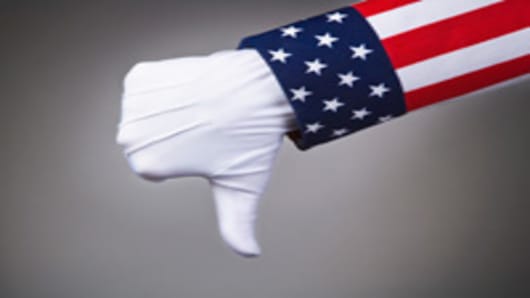The source of Friday's dismal jobs report isn't hard to trace—it starts with the mess in Washington and runs directly through the heart of American business.
In the face of already-low expectations, the U.S. economy still managed to disappoint in August, with no net job growth and an unbendingly high 9.1 percent unemployment rate.
For those watching the lackluster growth and its effect on the financial markets, there is little doubt that until the political calamity in Washington can get straightened out and remove the cloud of uncertainty over the jobs market, hiring isn't going anywhere.
"We've talked ourselves into being more conservative than we might be otherwise. There's a very good reason: The issues in Washington," says Rob Lutts, chief investment officer at Cabot Money Management in Salem, Mass. "They've created a large debt pile and they're not working well together. So confidence is really shattered."
Almost as if on cue following the release of the August jobs numbers, the warring factions lined up to place blame.
A statement from Republican National Committee Chairman Reince Prebus criticized President Obama for "his summer fundraising and golfing (during) his Martha’s Vineyard vacation—all while nearly 14 million Americans remained jobless."
At the same time, Labor Secretary Hilda Solis, in a CNBC appearance, blamed Congress for not acting on proposals the president has submitted.
All of the back-and-forth prattling has created paralysis for businesses that might otherwise be hiring but won't because of political and policymaking uncertainty regarding the country's fiscal direction. That uncertainty was heightened during the contentious debate over whether to raise the national debt ceiling.
"There is specific uncertainty, not general uncertainty," says Liz Ann Sonders, chief investment strategist at Charles Schwab in San Francisco. "We actually can put our finger on what businesses are uncertain about. A lot of it was exacerbated by the absurd antics that we witnessed in Washington."
"It was pulling on both sides. Telling seniors they're not going to get their Social Security checks—that was a very dangerous game and irresponsible," Sonders adds. Businesses "dug their heels in and said we're watching our policymakers behave quite poorly."
Yet Sonders also points out that "there's a big difference between not hiring and firing," and the numbers bear that position out to an extent.
Recent trends have indicated that companies do not have any aggressive hiring plans but are easing on the pace of layoffs. The most recent Institute for Supply Management readingshowed a slim majority of companies looking to take on more workers.
"There's this huge tug-of-war and until we know which side is going to win there's no reason for companies to put people to work now," says Mark Lamkin, CEO and chief market strategist at Lamkin Wealth Management in Louisville, Ky. "There's so much uncertainty on so many fronts."
That stagnation has prevented the economy from taking off, despite corporate earnings that appear solid.
"We can't get the positive feedback loop, where confidence improves and people start spending a little more and businesses start hiring more, and you're off to the races," says Josh Feinman, chief global economist at Deutsche Bank in New York. "That's the normal recovery dynamic and that has eluded us and continues to elude us."
To be sure, it's not all about Washington. The economy also is weighed down by the debt problems in Europe and the further uncertainty of how much contagion they will cause in the US.
But the toxic domestic political situation isn't helping.
"This recovery has just never had a lot of momentum. We had some fits and starts where things looked a little better," Feinman said. "Europe is weakening. We've had financial market turmoil and the fiscal battle in Washington. That hit confidence, too—as if the economy didn't have enough to deal with."
Investors, consequently, have taken the same tack as businesses, preparing for the possibility of another recession .
While sellers have not overpopulated the market, neither have buyers. Safe-haven strategies have become most popular with many flocking to bonds and gold.
Until the political picture clears and the economy finds a clearer path, that behavioral pattern is likely to continue.
"I wish I had a dollar for every time someone says the gold bubble is going to pop," Cabot's Lutts says. "Nothing could be further from the truth. Gold is money and not a bubble. It is now being treated like money because all the other money is being diluted by government leaders who refuse to take responsibility to do the right thing. They are debasing their currencies. Gold cannot be debased."
Lamkin says his strategy involves holding big cash allocations and large-cap dividend-paying stocks while Washington tries to devise a solution to the employment problem.
"All this stuff is smoke and mirrors. It's all going to come down to jobs at the end of the day," he says. "If the next couple of jobs reports are as bad as this one, get your Dow 10,000 hats out because we're going to use them again."



